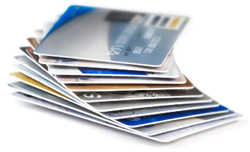 |
 |
 |
 |
 |
 |
 |
 |
Merchant Account TypesMerchant Account ProvidersNews & AdviceMerchant Account Tools |
 Print Print  Email Email Back to School, Part 2: Credit card processing, 4 key issuesNow that you know all the players in a credit card transaction, the next step is to learn all you can about credit card processing: what it is, how it works, how to maximize the system, how it will run on a day-to-day basis and how to protect it from would-be thieves. 
With that in mind, here are four key issues you'll need to consider before choosing a new system: 1.The hardware. First, check out a potential card processing system's hardware. Look closely for systems for card terminals that can easily handle both storefront and online payments. Also find out what kind of PIN pad additions your system will need. 2. The fees. Credit card processing fees may well be the number one financial issue for merchants when dealing with credit card payment systems. Expect no shortage of fees, including:
All of these charges are negotiable with card providers; the more you know about them, the better the fee deal you can cut. As soon as you come across a system you like, ask yourself, "What fees are involved?" 3. Service options. Next, ask, "What kind of service options can you get?" Your business and your customers are unique, so any card processing system you plug into your shop must accommodate those needs. To get the right system, ask yourself the following:
It's likely that you'll want a merchant account payment system that accommodates paper, phone, online and mobile device payments. But some processing systems specialize in mail-order or phone-order payments, and others primarily handle online or e-commerce accounts. The key takeaway: Know what your business needs, be able to spell it out thoroughly to any potential card payment systems vendor and increase your chances of getting exactly what you need. 4. Security. Finally, ask yourself, "Is the card payment system secure?" Customer financial data has to be protected, although identity thieves will do whatever they can to illegally get that information. So make sure your card payment system complies with the Payment Card Industry Data Security Standard (PCI DSS). PCI compliance ensures your merchant business has taken the correct measures and precautions that satisfy industry standards, and it should go a long way in keeping your customers' personal financial data as safe as possible. The good news is that prices for card processing systems are in decline: You can actually get a good unit payment system for about $400. But before you write any checks or pull out any credit cards, make sure you cover the themes laid out above. They'll help you break down the keys to any merchant payment processing system and help increase the chances of landing the right system for your retail business. See related: Back to School, Part 1: The major players in a credit card transaction; Video: How does credit card processing really work? Published: June 29,2025Comments or Questions, Library of Stories
|
|||||||||||||